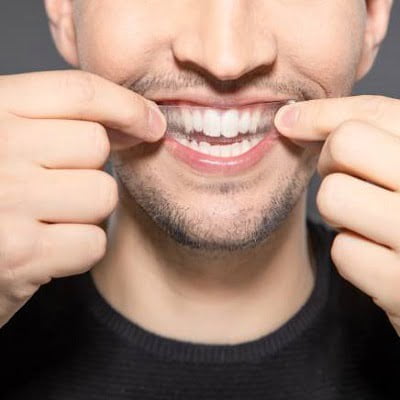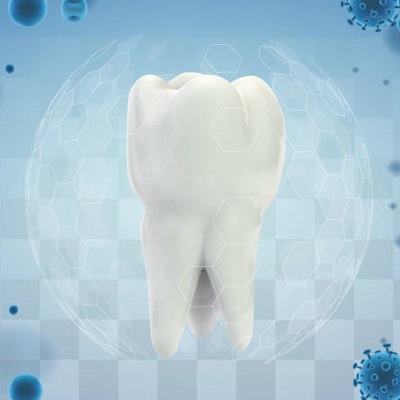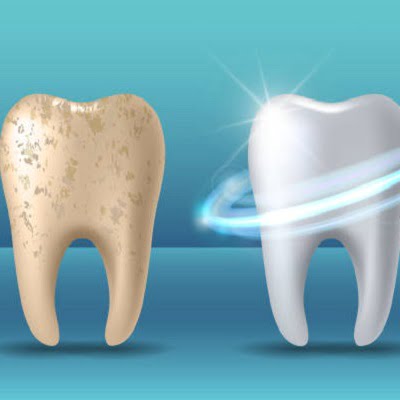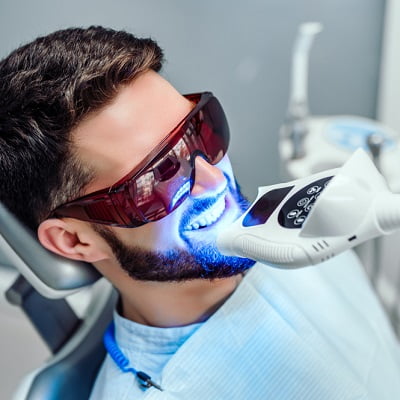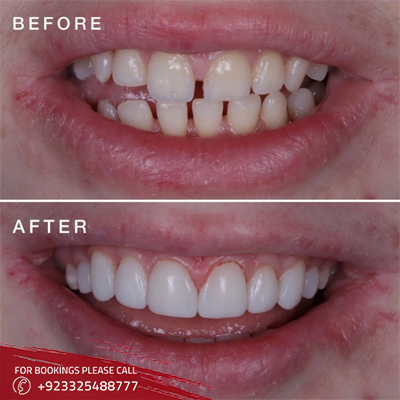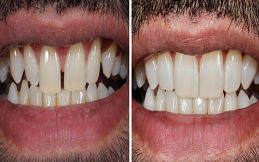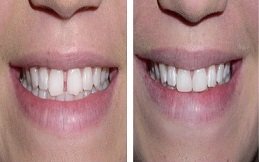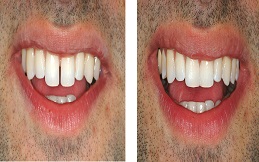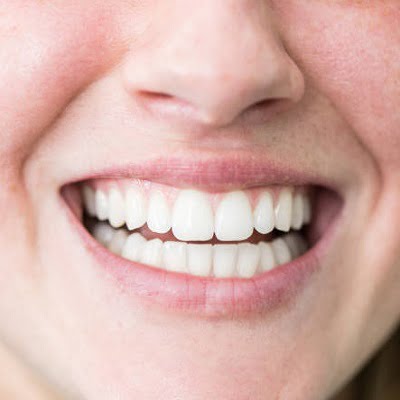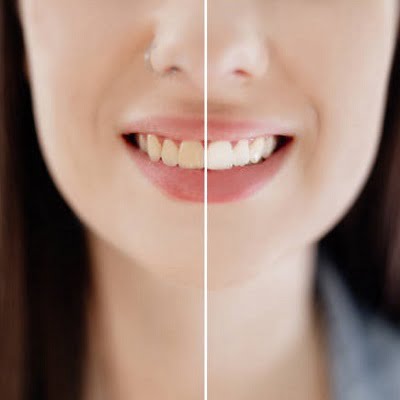A great grin boosts a person’s confidence and enhances their overall appearance. Tooth bonding is highly successful and accessible to the common individual. Even chipped, discolored, or slightly misaligned teeth may be quite appealing, and dental bonding is a low-cost way to accomplish so. If you are looking for a “Dentist Near Me in Islamabad” or a reputable “Dental Clinic in Islamabad,” our professionals at SKN Cosmetics Islamabad can assist.
Dental bonding is a cosmetic technique that employs tooth-colored composite resin to improve your smile. This treatment is used to fix defects, correct gaps, or alter the contour and color of a tooth. Dental bonding, unlike other cosmetic dental procedures like porcelain veneers, is fully reversible.
Quick Facts
- Procedure Type: Non-Invasive
- Duration: 20-30 Minutes
- Recovery: Immediately
- Results: Long-Lasting
- Cost: PKR 2,999 to PKR 8,000
What Is A Tooth Bonding?
Tooth bonding is a cosmetic dentistry treatment in which the dentist uses a tooth-colored resin substance to bind to your teeth. It is sculpted, toughened using a special light, and polished to blend in with your natural teeth. Tooth bonding is more straightforward than other cosmetic dental treatments. This process is so easy that it seldom requires anesthetic — unless you are filling a cavity — and does not necessitate several trips to the dentist. Our “Best Dentist Islamabad” professionals can help you.
The method swiftly corrects small tooth flaws, and there is no discomfort involved.
When Is Dental Bonding Recommended?
Dental bonding is a cosmetic treatment that improves the appearance of your smile. The technique utilizes tooth-colored composite resin material to:
- Conceal any chips or fissures in your teeth.
- Camouflage tooth discolouration.
- Close the gaps and crevices between your teeth.
- Make your teeth appear longer.
- Adjust the form of your teeth.
Restorative dentistry use the same composite resin material as dental bonding to:
- Fill voids.
- Replace your outdated silver dental fillings with a more attractive replacement.
- Protect the dental roots that have been exposed owing to recession.
Teeth Bonding Vs Dental Veneers: What Is The Difference?
Porcelain veneers are custom-made ceramic shells that fit over the front surfaces of your teeth. To put them on, your dentist will often have to remove some enamel from your natural teeth. Porcelain veneers are irreversible after they have been installed. They will need to be replaced every ten to twenty years.
Dental bonding, on the other hand, may not need extensive enamel removal. As a result, bonding is fully reversible. You will probably require touch-ups every three to ten years.
You may hear dentists use the term “composite veneers.” This is when your dentist applies composite resin material to the full surface of your tooth.
How Does A Tooth Bonding Work?
To begin the procedure, your dentist utilizes a shade guide to select a composite resin hue that closely matches the color of your natural teeth. Your dentist roughens the surface of the tooth and then administers a liquid that permits the bonding agent to adhere to it. Your dentist will apply the composite resin to the liquid, mold or shape the tooth, and then solidify the material using an ultraviolet light.
If required, your dentist can shape the tooth once the resin has hardened.
What To Expect In Results?
According to SKN Cosmetics, this dental procedure lasts for 3 to 10 years before requiring a touch-up or replacement. It depends on how much bonding was performed and the oral habits of an undergoing candidate. Compared to natural teeth, bonded materials don’t have the same strength, and due to some habits, the life span gets shorter. So, avoid biting hard stuff, do not smoke or drink alcohol to maintain the bonding. Outcomes may depend on person to person.



Benefits:
Tooth Bonding can offer top benefits, including:
- Tooth bonding is less expensive than other cosmetic dentistry procedures like crowns and veneers.
- Each tooth will take around 30-60 minutes to adequately treat, and the entire operation may be finished in one visit. We provide “Dental Implants Islamabad“ treatments for replacement.
- In contrast to other procedures, tooth bonding often does not require the use of anesthesia. It is an excellent choice for anyone seeking a non-invasive surgery that improves their appearance without causing discomfort.
- Tooth bonding is also reversible and changeable, making it adaptable to your needs. Our “Teeth whitening in Islamabad“ specialists may assist with cosmetic enhancements.
- While porcelain veneers and dental crowns necessitate extensive tooth modification, dental bonding often does not involve enamel removal.
- Dental bonding can mask a variety of esthetic flaws, including chipping, fissures, gaps, and discoloration.
- Other cosmetic treatments, including veneers and crowns, need many visits. Dental bonding can be accomplished in a single office visit.
Who Is An Ideal Candidate For A Tooth Bonding?
Anyone can be an ideal candidate for Tooth Bonding if they;
- Have teeth defects or imperfections.
- Want to repair the decayed teeth.
- Desire to fill the small gaps between teeth.
- Want to increase the size of the tooth.
- Are you looking to change the shape of the teeth?
- Want a smile makeover.
How Long Does Tooth Bonding Results Last?
The longevity of bonding materials is determined by a variety of factors, including your dental habits and the number of teeth treated. Typically, bonding material lasts three to ten years before needing to be touched up or replaced.
When Should I See My Dentist For Dental Bonding?
If you have chipping, cracks, discoloration, or other concerns regarding the appearance of your teeth, make an appointment with the dentist. They can discuss your cosmetic objectives and create a treatment plan that is tailored to your specific requirements.
If you have just undergone cosmetic dental bonding, see your dentist if your bite feels “off.” They can fix this problem in a fast session.
Initial Consultation
Prior to dental bonding, your dentist will meet with you to discuss your esthetic goals. They will also take dental X-rays and inspect your teeth and gums to ensure you are a candidate for the surgery. If you have significant tooth decay, gum disease, or other major oral health issues, you should definitely address those first.
What To Expect During Tooth Bonding?
The following are the stages involved in Tooth Bonding:
- Select a shade. Your dentist will use a shade guide to pick a composite resin material that is the same hue as your natural teeth.
- Prepare your teeth. Your tooth’s surface is roughened, and a conditioning liquid is administered. These methods assist the bonding substance in adhering to your tooth.
- Apply the composite resin material. The resin substance (which has a putty-like consistency) is applied, shaped, and smoothed into the appropriate form.
- Cure the materials. The composite resin is then solidified using a special curing laser, which “bonds” the substance to the surface of your teeth.
- Polish your teeth. Finally, your dentist will make any final modifications and polish your tooth to a natural-looking finish.
- The process takes around 30 to 60 minutes per tooth to complete.
Recovery Period
Teeth bonding takes no downtime. You will be able to return to your usual activities as soon as you leave your dentist’s office. Simply maintain proper oral hygiene routines. Brush your teeth twice a day, floss once a day, and visit your dentist for regular check-ups and cleanings.
Because bonding material can chip, prevent activities like biting your fingernails, chewing on pencils, or opening things with your teeth. If you discover any sharp edges on a bonded tooth or if it feels unusual when you bite down, contact your dentist.
Tooth Bonding Aftercare Instructions
Following aftercare instructions are critical for achieving optimal results and reducing problems.
- Following dental bonding, appropriate oral hygiene is required to maintain your mouth healthy and sparkling.
- Brush at least twice a day with a soft toothbrush and fluoride toothpaste, and floss between your teeth once a day.
- In addition, you should see your dentist on a regular basis for checkups and cleanings.
- Avoid hard meals and sweets.
- Avoid chewing your nails.
- To prevent stains, avoid coffee, tea, and smoke for the first two days following the treatment.
- Schedule routine dental cleanings every six months.
Tooth Bonding Side Effects
Following are Tooth Bonding side effects;
- Tooth Sensitivity
- Discoloration and Staining
- Chipping and Cracking
- Marginal Leakage
Cost of Tooth Bonding In Islamabad
The cost of a Tooth Bonding in Islamabad, Pakistan, may range from PKR 2,999 to PKR 8,000. On average, the cost of Dental Bonding in Pakistan varies according to the tooth condition, the number of teeth that need to be treated and the dentist’s expertise.
Cost-related factors:
- Number of teeth being treated
- Extent of damage or correction needed
- Type of bonding used
- Dentist’s expertise and clinic location
Starting Cost (PKR) PKR 2,999 | Final Cost (PKR) PKR 8,000 |
Is Dental Bonding Painful?
Dental bonding is normally painless since your dentist will not be operating near the pain-sensing nerve within your tooth. Most of the time, dental bonding does not require an anesthetic. Some people may feel transient sensitivity following the dental bonding process. Over-the-counter pain medications can alleviate the discomfort.
Why Choose SKN Cosmetics For Tooth Bonding In Islamabad?
At SKN Cosmetics, our skilled dental experts are dedicated to offering high-quality care with a personal touch. If you want to improve your smile and enhance your confidence without breaking the budget, tooth bonding might be the right option. If you want to make your smile bright or want to fix dental issues like chipped, cracked, or damaged teeth, then feel free to consult Cosmetic Surgery in Islamabad for dental bonding treatment. We are here to provide you with amazing services and satisfying results.
Book Your Free Consultation!
Cosmetic flaws such as chips, gaps, fissures, or discolouration can detract from your smile and make you feel less confident. Dental bonding is a simple and efficient treatment for restoring harmony and uniformity to your smile. Consult your dentist at SKN Cosmetics Clinic in Islamabad to see whether it is appropriate for you.
FAQs
Cosmetic dental bonding is quite frequent. In fact, it is one of the most used treatments in dentistry today.
In general, dental bonding poses no harm to your oral health. If you have healthy teeth and gums, it is completely safe.
However, if you have chronic tooth decay, gum disease, or other major oral health conditions, you may require additional therapy before proceeding with dental bonding.
No. Dental bonding is reversible since it does not necessitate the removal of enamel.
Yes, but avoid hard meals for 24–48 hours to allow the debris to settle.
Bonding is less expensive and less intrusive, but veneers are more durable and stain-resistant.
No, the resin does not react to whitening; you may need to rebond or polish.



